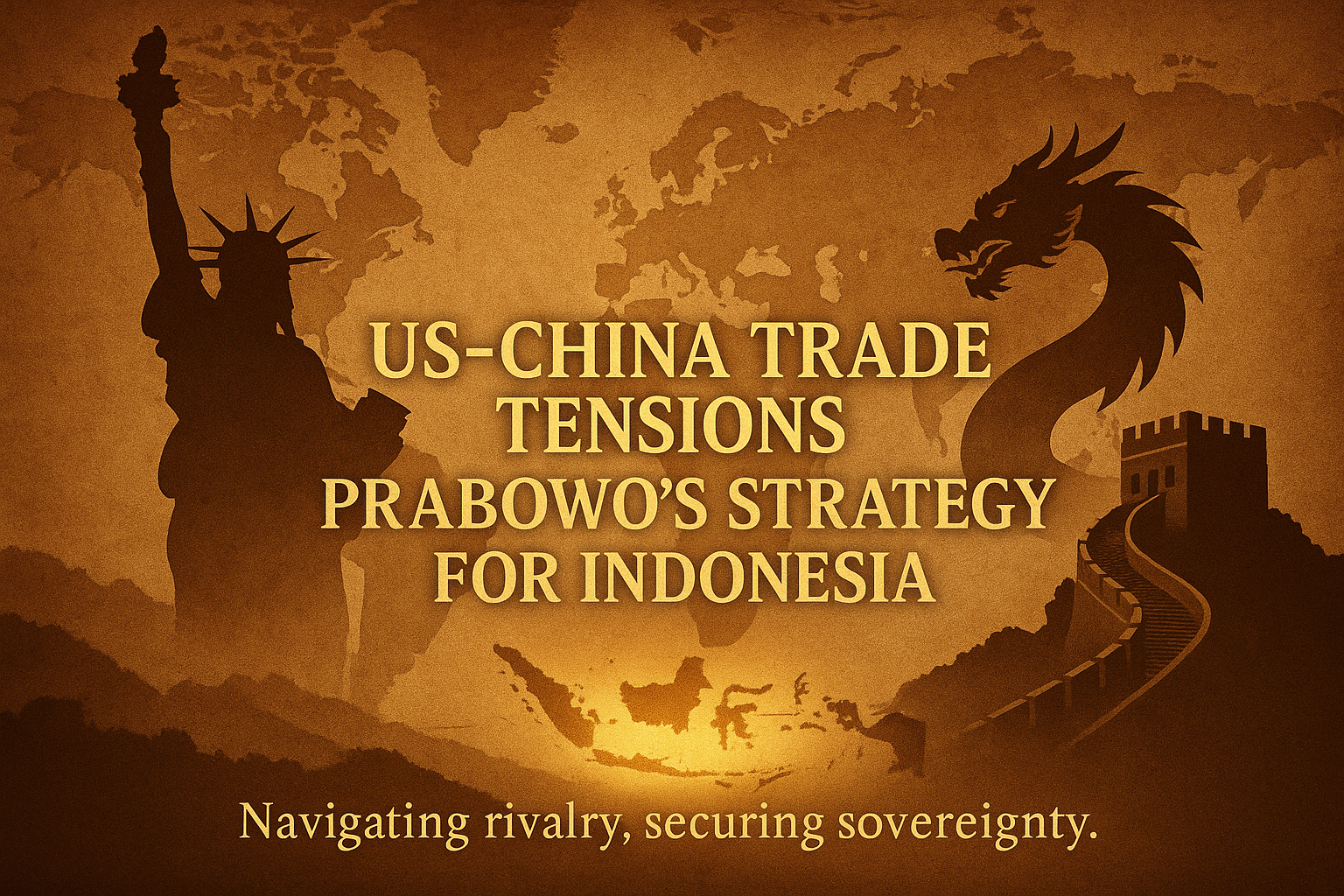Introduction: Why US–China Trade Tensions Matter for Indonesia
The escalating trade tensions between the United States and China have become one of the most pressing issues in international politics today. These tensions go far beyond economic disputes, shaping the trajectory of global security and diplomacy. For Indonesia, now under the leadership of President Prabowo Subianto, this rivalry presents both an opportunity to rise as a sovereign middle power and a risk of being caught in the crossfire between two global giants.
During the Cold War, the United States responded to Soviet challenges with alliances, sanctions, and deterrence. Today, similar patterns emerge as Washington seeks to contain Beijing’s growing influence. Unlike the Cold War, however, the battleground now includes technology, supply chains, and global trade routes. For Prabowo, this means that economic strategy is inseparable from foreign policy and security.
The phrase “All eyes on China” reflects a consensus among global analysts that Beijing’s next moves will define international relations in the 21st century. Indonesia, by virtue of its geography in the Indo-Pacific, is positioned directly within the fault lines of this rivalry. How Jakarta responds will shape its economic future, political stability, and security posture.
Prabowo’s administration inherits a philosophy of pragmatic diplomacy from Jokowi but adapts it with a stronger emphasis on sovereignty and defense. This approach highlights the reality that neutrality in today’s world is not passive but active, requiring careful balancing and strategic foresight.
The US–China contest will not be settled soon. It is a rivalry that will last for decades, reshaping trade routes, investment flows, and regional security. Indonesia’s challenge is to craft a long-term strategy that prevents dependency while ensuring growth.
Thus, understanding the dynamics of the trade war is essential. Without such an understanding, Indonesia risks being reduced to a pawn in a geopolitical game where the stakes involve sovereignty, prosperity, and survival.
China’s Belt and Road Initiative and Its Impact on Indonesia
China’s Belt and Road Initiative (BRI) has redefined the geopolitics of Asia. Through this ambitious project, Beijing has financed and constructed railways, highways, ports, and power plants across dozens of countries. Southeast Asia, due to its strategic geography, has been a central focus of China’s BRI diplomacy, and Indonesia has emerged as one of its key partners.
Major projects such as the Jakarta–Bandung high-speed rail and nickel mining investments in Sulawesi have highlighted the scale of Chinese involvement in Indonesia’s economy. These projects provide visible benefits, from improved infrastructure to increased industrial capacity. Yet, they also illustrate Indonesia’s growing dependence on Chinese capital and expertise, raising questions about long-term sovereignty.
Chinese investment, while beneficial, carries geopolitical weight. Economic ties often extend into political leverage. In the South China Sea, where Indonesia’s exclusive economic zone has faced encroachments by Chinese vessels, the tension between economic partnership and sovereignty becomes evident. Jakarta must balance cooperation with caution, ensuring that national interests are not compromised.
Other Southeast Asian nations present contrasting models. Vietnam accepts Chinese investments but resists Beijing’s maritime ambitions, often aligning with the United States. Cambodia, on the other hand, has tied itself closely to Beijing, effectively limiting its diplomatic autonomy. Indonesia must navigate a middle path, maximizing benefits while avoiding overdependence.
China’s role as the second-largest investor in Indonesia cannot be ignored. However, reliance on a single partner exposes Indonesia to strategic risks, especially if relations sour. Prabowo’s challenge is to manage these ties while strengthening domestic capacity for industrialization and technological independence.
The rise of China is a reality Indonesia cannot escape. The question is whether Indonesia can harness this rise for its own long-term benefit, or whether it will be pulled into China’s orbit at the expense of sovereignty.
The United States and Its Strategic Response to China
While China has expanded its reach, the United States has not remained idle. Washington has revitalized alliances with Japan, South Korea, the Philippines, and Australia, forming a defensive network aimed at counterbalancing Beijing’s growing assertiveness. These alliances mirror the Cold War containment strategy, but they also reflect the unique features of today’s competition.
Naval patrols in the South China Sea exemplify America’s commitment to maintaining freedom of navigation. These actions serve both as a deterrent to Chinese militarization and as reassurance to Southeast Asian nations that Washington remains a reliable partner in regional security. For Indonesia, these patrols are a reminder that the Indo-Pacific will remain a contested arena.
The technological dimension of this rivalry is equally important. Washington’s restrictions on Chinese companies such as Huawei highlight fears that Beijing could dominate critical digital infrastructures. Control of semiconductors, artificial intelligence, and 5G networks has become as significant as control of sea lanes during the Cold War.
Indonesia faces a dilemma in this context. Aligning too closely with Washington could endanger access to Chinese capital, while ignoring American concerns risks alienating a long-standing security partner. The balancing act requires Jakarta to maintain credibility with both powers without being absorbed into either camp.
Think tanks in the United States consistently argue that China’s growing influence in Southeast Asia must be checked. These narratives influence policy and shape Washington’s expectations. For Indonesia, the message is clear: neutrality will be tested repeatedly as pressure to “choose sides” intensifies.
Prabowo must emphasize Indonesia’s doctrine of politik luar negeri bebas aktif—a free and active foreign policy—as a shield against external pressure. Neutrality, in this sense, is not weakness but the foundation of sovereignty.
Global Uncertainty and Its Spillover into Indonesia
The US–China trade war unfolds against a backdrop of global instability. In the Middle East, the Israeli–Palestinian conflict continues to inflame tensions, while wars in Syria and Yemen prolong instability. These crises shape energy markets and create ripple effects across the world.
The war in Ukraine adds another layer of complexity. It has fractured Europe’s relationship with Russia, pushed NATO to expand, and deepened Moscow’s reliance on Beijing. For Indonesia, the impact is indirect but real: rising food prices, energy volatility, and shifting trade dynamics complicate its domestic agenda.
European nations themselves are divided. Germany and France rely heavily on Chinese markets for exports, yet they remain security dependents of the United States. This contradiction makes Europe an uncertain partner, unable to fully commit to either side in the US–China rivalry.
The global South, including many countries in Asia, Africa, and Latin America, has responded by seeking greater independence. Indonesia resonates with this trend, presenting itself as part of a multipolar order that refuses to be dominated by any one bloc. Prabowo’s rhetoric of sovereignty fits this broader movement.
In such a fragmented world, resilience becomes a key measure of sovereignty. Food security, energy independence, and technological self-reliance are as critical as military strength. Indonesia must prepare for crises that are not of its making but will inevitably affect its stability.
The global environment is therefore both a warning and an opportunity. If Indonesia can adapt with foresight, it may emerge stronger. If not, it risks being caught unprepared in a turbulent century.
Prabowo’s Vision of Sovereignty and Strategic Balance
President Prabowo Subianto’s strategic vision rests on sovereignty as the guiding principle of Indonesia’s rise. His ambition is to see Indonesia transformed into a developed nation by 2045, grounded in economic resilience, military modernization, and political stability.
Economic sovereignty is central to this vision. By reducing reliance on imports and maximizing domestic resources, Prabowo aims to foster industrialization and technological independence. This is particularly important as Indonesia seeks to avoid dependence on foreign capital, whether from Beijing or Washington.
Military sovereignty is another priority. Indonesia’s vast maritime territory requires strong defense capabilities to safeguard sovereignty in the South China Sea and the Straits of Malacca. Prabowo’s emphasis on reintegrating the military into national strategy reflects his belief that security underpins economic and political independence.
Political sovereignty completes the picture. For Prabowo, this means maintaining flexibility in foreign policy, avoiding entanglement in great-power rivalries, and ensuring that Indonesia’s choices are guided by national interests rather than external pressures.
His decision to visit China soon after his inauguration illustrates this approach. It was a pragmatic move to strengthen economic ties, but it was framed as part of Indonesia’s broader sovereignty-centered strategy. The goal is partnership without dependency, engagement without submission.
Prabowo’s sovereignty doctrine is thus not rhetorical but practical. It requires discipline, foresight, and a willingness to endure short-term challenges for long-term independence.
Indonesia’s Path Forward in the US–China Rivalry
The rivalry between Washington and Beijing will shape the Indo-Pacific century. For Indonesia, the challenge is not whether to align with one or the other, but how to safeguard its sovereignty while benefiting from both. This requires a delicate and proactive strategy.
Indonesia must diversify its partnerships. Welcoming Chinese investment should not mean ignoring opportunities with the United States, Japan, or Europe. A balanced economic policy will reduce vulnerability to external shocks and preserve independence.
Diplomacy is equally vital. Through ASEAN and other multilateral forums, Indonesia can amplify its voice and prevent Southeast Asia from becoming the battleground of a new Cold War. Regional unity will be critical in resisting the pressure to take sides.
Security considerations also demand attention. The South China Sea and the Straits of Malacca are lifelines of global trade. Ensuring their stability requires both military preparedness and diplomatic engagement. Indonesia must play an active role in shaping the rules of the region.
History shows that nations that guarded their sovereignty while adapting to change found prosperity. Those who surrendered to dependency lost their freedom of choice. Prabowo’s administration must learn from this lesson and chart an independent course.
In the end, Indonesia’s destiny will be determined by its ability to navigate this rivalry with wisdom. If successful, Prabowo will position the nation not as a pawn but as a leader in the Indo-Pacific, shaping the future of the global order by 2045.



Leave a Reply